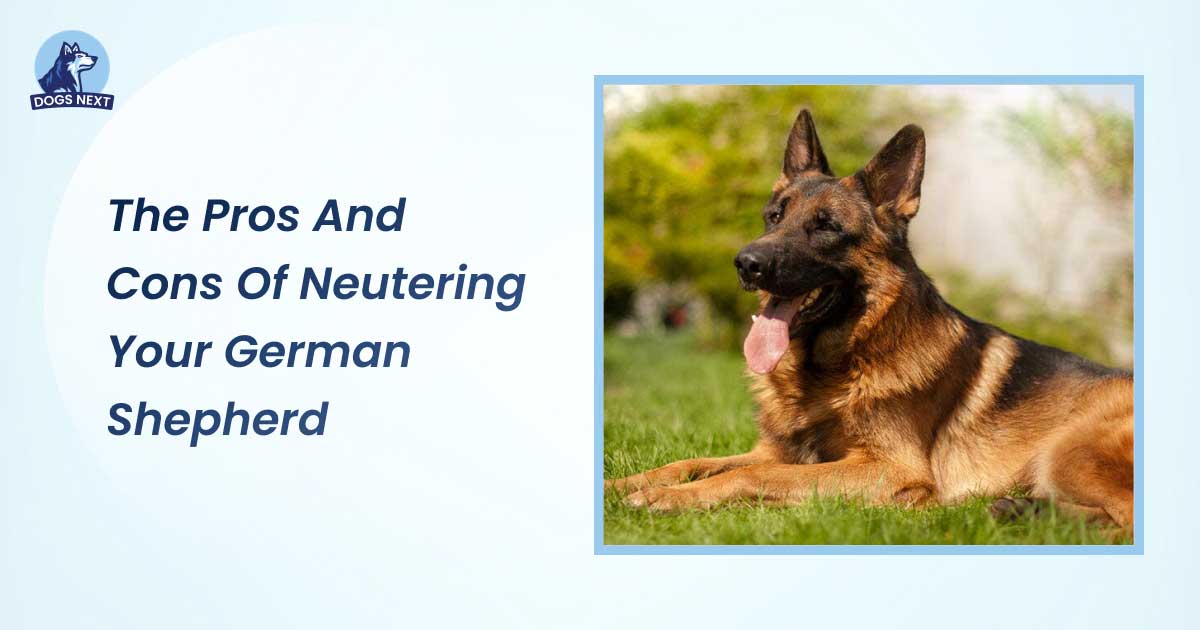Neutering can reduce aggression and prevent unwanted litters. It may also lead to potential health issues and behavioral changes.
**** Neutering your German Shepherd is a significant decision that impacts their health and behavior. This procedure involves the removal of reproductive organs, which can have various benefits and drawbacks. Pet owners often consider neutering to prevent overpopulation and reduce aggressive tendencies.
On the flip side, neutering may pose certain health risks, including hormonal imbalances and potential weight gain. Understanding the pros and cons is essential for making an informed choice. This guide delves into the benefits and potential downsides of neutering your German Shepherd, helping you weigh the options carefully. Make the best decision for your furry friend’s well-being and long-term health.
Health Benefits Of Neutering
Neutering your German Shepherd has both pros and cons. One of the most significant aspects to consider is the health benefits of neutering. This procedure can offer numerous advantages that contribute to a healthier and happier life for your furry friend.
Reducing The Risk Of Certain Cancers
Neutering your German Shepherd can significantly reduce the risk of certain cancers. This procedure removes the testicles, which means no testicular cancer. Additionally, it lowers the risk of prostate cancer and other prostate-related issues. Here are some key points:
- Eliminates the risk of testicular cancer entirely.
- Reduces the risk of prostate cancer and infections.
- Decreases the chances of perianal tumors and hernias.
According to veterinary experts, neutered dogs live longer and healthier lives. They are less prone to life-threatening illnesses and complications. A study published in the Journal of Veterinary Medicine indicated that neutered dogs have a lower incidence of certain cancers compared to their intact counterparts.
Decreasing Aggressive And Dominant Behaviors
Neutering can also help in decreasing aggressive and dominant behaviors in German Shepherds. This breed is known for its protective nature, which can sometimes translate into unwanted aggression. Neutering can lead to:
- Reduced aggression towards other dogs and animals.
- Less marking of territory with urine.
- Decreased dominance-related behaviors such as mounting.
Behavioral experts suggest that neutered dogs are generally more relaxed and less likely to engage in fights or show dominance. This can make your German Shepherd more sociable and easier to manage. Training becomes simpler as the dog is less driven by hormonal impulses.
Here is a quick comparison table to illustrate the behavioral changes:
| Behavior | Neutered | Not Neutered |
| Aggression | Lower | Higher |
| Marking Territory | Less Frequent | More Frequent |
| Dominance | Reduced | Increased |
Prevention Of Overpopulation And Unwanted Puppies
One of the most important benefits of neutering is the prevention of overpopulation and unwanted puppies. Millions of dogs end up in shelters every year, and not all find homes. By neutering your German Shepherd, you contribute to reducing this number. Key benefits include:
- Preventing unplanned litters.
- Reducing the number of stray dogs.
- Lowering the burden on animal shelters.
Neutered dogs cannot contribute to the overpopulation problem. This helps in controlling the dog population and ensures that more dogs in shelters get a chance to find a home. Responsible pet ownership includes making decisions that benefit the broader animal community, and neutering is a significant step in that direction.
In summary, neutering your German Shepherd offers numerous health benefits. It reduces the risk of certain cancers, decreases aggressive behaviors, and helps in the prevention of overpopulation.
How Neutering Affects Your German Shepherd’s Behavior
Neutering your German Shepherd can have a significant impact on their behavior. Many dog owners consider this procedure to help manage their pet’s actions and overall temperament. This section explores the specific ways neutering can affect your German Shepherd’s behavior.
Reduction In Roaming, Barking, And Aggression
Neutering can lead to a noticeable reduction in roaming behaviors. Male German Shepherds, especially, have a natural instinct to roam in search of a mate. This can lead to them wandering far from home, risking their safety. Neutering reduces this instinct, making your dog more likely to stay close to home.
Another common benefit is the decrease in excessive barking. German Shepherds are known for their vocal nature, and neutering can help calm this trait. This is particularly useful for owners who live in apartments or close neighborhoods where constant barking can be a nuisance.
Neutering also helps in reducing aggression. Intact males are more prone to aggressive behaviors, especially towards other male dogs. This aggression can lead to fights and injuries. Neutering reduces the levels of testosterone, which can help in calming these aggressive tendencies.
Here’s a quick summary of the behavioral changes post-neutering:
| Behavior | Pre-Neutering | Post-Neutering |
| Roaming | High | Low |
| Barking | Frequent | Reduced |
| Aggression | Common | Less Common |
Neutering can transform your German Shepherd into a more manageable and friendly companion. This procedure can help improve your pet’s quality of life and enhance your bond with them. Always consult with your veterinarian to understand the best time and approach for neutering your German Shepherd.
The Risks And Downsides Of Neutering
Neutering your German Shepherd can have both benefits and drawbacks. While it can prevent certain health issues and unwanted litters, there are also risks and downsides to consider. Understanding these potential negative aspects can help you make an informed decision.
Potential Health Risks With Early Neutering
Neutering your German Shepherd at an early age can lead to several health risks. Early neutering can impact your dog’s overall health and well-being. Here are some potential health risks associated with early neutering:
- Increased Risk of Joint Disorders: Early neutering can affect the growth plates, leading to joint issues like hip dysplasia and arthritis.
- Higher Chances of Certain Cancers: Studies suggest a link between early neutering and an increased risk of cancers such as hemangiosarcoma and osteosarcoma.
- Endocrine Disorders: Early neutering can lead to thyroid problems and other endocrine-related disorders.
The following table summarizes the potential health risks:
| Health Risk | Description |
| Joint Disorders | Impact on growth plates causing hip dysplasia and arthritis. |
| Cancers | Increased risk of hemangiosarcoma and osteosarcoma. |
| Endocrine Disorders | Potential for thyroid issues and other endocrine problems. |
Growth And Development
Neutering can also affect the growth and development of your German Shepherd. Early neutering can interfere with the natural growth process:
- Altered Growth Plates: Neutering before maturity can cause the growth plates to close later than they should, leading to longer bones and potential skeletal issues.
- Imbalanced Hormones: Hormones play a crucial role in development. Removing reproductive organs early can lead to hormonal imbalances.
- Behavioral Changes: Some behavioral traits that develop with age might be affected, potentially leading to anxiety or aggression.
To better understand the impact, consider the following points:
- Physical Development: Puppies need hormones for proper muscle and bone development.
- Mental Maturity: Hormones also affect mental and emotional growth, influencing behavior.
- Health Concerns: Delayed closure of growth plates can lead to orthopedic issues.
Weight Gain After Neutering
Another downside to neutering is the potential for weight gain. Neutered dogs often experience changes in metabolism and appetite:
- Reduced Metabolic Rate: Neutering can slow down the metabolism, making it easier for dogs to gain weight.
- Increased Appetite: Some dogs may have an increased appetite after neutering, leading to overeating.
- Lack of Activity: Neutered dogs might become less active, contributing to weight gain.
Weight gain can lead to several health issues, such as:
- Obesity: Excess weight can lead to obesity, which brings a host of other health problems.
- Joint Problems: Additional weight puts extra strain on joints, leading to arthritis and other issues.
- Heart Disease: Overweight dogs are at a higher risk of developing heart disease.
To manage weight gain:
- Monitor Diet: Keep a close eye on your dog’s diet and adjust portions as needed.
- Regular Exercise: Ensure your dog gets regular exercise to burn off extra calories.
- Consult a Vet: Work with your veterinarian to create a healthy weight management plan.
Best Age To Neuter A German Shepherd
Neutering your German Shepherd is a significant decision for their health and well-being. Many pet owners wonder about the best age to neuter their furry friends. The timing of this procedure can impact their growth, behavior, and overall health. Understanding the pros and cons of neutering at various ages is crucial.
Veterinary Recommendations For Timing Neutering
Veterinarians often provide guidelines on the optimal age for neutering German Shepherds. They consider the dog’s growth, health status, and behavioral aspects. Generally, experts recommend neutering between six and twelve months, but it can vary based on individual circumstances.
Here are some key points to consider:
- Early Neutering (before six months): This can prevent unwanted litters and reduce certain health risks. Early neutering may also lower the risk of aggressive behavior.
- Standard Neutering (six to twelve months): This is the most common recommendation. It balances the benefits of neutering with the dog’s development stages.
- Late Neutering (after twelve months): Some experts suggest waiting until the dog is fully grown. This can help avoid potential growth issues and allow for better joint development.
Here’s a table summarizing the veterinary recommendations for timing neutering:
| Age Range | Pros | Cons |
| Before six months | Reduces risk of certain cancers, prevents unwanted litters | May affect growth and bone development |
| Six to twelve months | Balances health benefits and development stages | May not be suitable for all dogs |
| After twelve months | Allows full physical development, reduces joint issues | Increased risk of certain cancers |
Consulting with your veterinarian is essential. They can provide personalized advice based on your German Shepherd’s specific needs.
Early Vs Late Neutering
Neutering your German Shepherd can influence their health and behavior. Deciding when to neuter is crucial. Early neutering and late neutering each have their own benefits and drawbacks. Understanding these can help you make the best choice for your furry friend.
Early Neutering
Early neutering means neutering your German Shepherd before they reach sexual maturity, usually before six months of age. This choice offers several advantages but also comes with some cons.
| Pros | Cons |
Reduces the risk of unwanted littersDecreases aggressive behaviorPrevents certain cancers | May impact bone growthIncreases risk of joint disordersPotential hormonal imbalances |
Late Neutering
Late neutering means neutering your German Shepherd after they reach sexual maturity, typically between 12 to 18 months of age. This approach also has its own set of pros and cons.
| Pros | Cons |
Allows full physical developmentReduces risk of joint issuesBetter hormonal balance | Higher chance of aggressive behaviorIncreased risk of certain cancersPotential for unwanted litters |
Factors To Consider
When deciding the timing of neutering your German Shepherd, consider their health, behavior, and lifestyle. Consult your vet for personalized advice.
Recovery And Post-neutering Care
Neutering your German Shepherd is a significant decision that impacts their health and behavior. Understanding the recovery and post-neutering care is crucial for ensuring a smooth process. This section covers what to expect after surgery and provides tips for a successful recovery.
What To Expect After Surgery
After surgery, your German Shepherd will need time to recover. The first 24-48 hours are critical. You may notice your dog feeling drowsy and less active due to the anesthesia.
Here are some common post-surgery symptoms:
- Drowsiness: Your dog might sleep more than usual.
- Appetite loss: It’s normal for them to eat less.
- Swelling and redness: The incision site may appear swollen and red.
- Limited movement: Your dog may be reluctant to move much.
It’s important to monitor these symptoms and consult your vet if anything seems unusual.
| Symptom | Duration | Action |
| Drowsiness | 24-48 hours | Allow rest |
| Appetite loss | 1-2 days | Offer small meals |
| Swelling | Up to a week | Monitor for infection |
| Limited movement | Several days | Restrict activity |
Tips For Ensuring A Smooth Recovery
To ensure your German Shepherd recovers well, follow these tips:
- Provide a Comfortable Space: Create a quiet, comfortable space for your dog to rest. Avoid stairs and jumping.
- Monitor the Incision: Check the incision site daily for signs of infection like pus or excessive redness.
- Limit Activity: Prevent your dog from running or jumping. Leash walks are fine, but avoid strenuous activity.
- Use a Cone: Prevent your dog from licking the incision by using an Elizabethan collar (cone).
- Follow Medication Instructions: Administer any prescribed medications as directed by your vet.
- Keep Hydrated: Ensure your dog has access to fresh water at all times.
- Follow-Up Visits: Schedule follow-up visits with your vet to ensure proper healing.
These tips help ensure a smooth and speedy recovery for your German Shepherd. Consistent care and monitoring are key to a healthy post-surgery experience.
Ethical Considerations Of Neutering
Neutering your German Shepherd is a significant decision. While it has many benefits, it’s essential to consider the ethical aspects. This section delves into the ethical considerations, weighing the pros and cons of neutering. By understanding these factors, you can make an informed and compassionate choice for your furry friend.
Animal Welfare: Neutering can prevent unwanted litters, reducing the number of homeless dogs. This action can save many animals from suffering and neglect. But some argue it might deprive the dog of natural experiences.
Health Benefits vs. Natural Rights: Neutering can prevent certain cancers and infections. These health benefits might extend your dog’s life. Yet, some believe it infringes on the dog’s natural rights, altering their body without consent.
Religious And Cultural Beliefs
Religious Views: Different religions have varied stances on neutering. Some may see it as altering God’s creation. Others might view it as a responsible act to prevent suffering.
Cultural Practices: Various cultures have unique practices regarding pet care. In some cultures, neutering is standard. In others, it might be frowned upon or seen as unnecessary.
Environmental Impact
Population Control: Neutering helps control the pet population. This action can reduce the strain on animal shelters and resources. It also helps in managing stray dog populations, which can impact local wildlife and ecosystems.
Resource Allocation: By controlling the dog population, resources like food, medical care, and shelter can be better allocated. This approach ensures that existing dogs receive better care and attention.
Psychological And Social Effects
Behavioral Changes: Neutering can lead to calmer behavior in dogs. It might reduce aggression and roaming tendencies. This change can make the dog more manageable and safer around people and other pets.
Social Interactions: Neutered dogs might interact differently with other dogs. They may face fewer confrontations and be more accepted in social settings. This can lead to a happier and more social life for your pet.
Frequently Asked Questions
Should I Neuter My German Shepherd?
Neutering can reduce health risks and unwanted behaviors. It helps control the pet population. However, it might affect their growth and energy levels. Consult your vet for personalized advice.
What Are The Benefits Of Neutering German Shepherds?
Neutering reduces the risk of certain cancers. It can decrease aggression and territorial behaviors. It also helps in controlling the pet population. Always consider professional advice.
Are There Any Risks To Neutering?
Neutering may affect your dog’s growth. It can lead to weight gain and hormonal changes. Some dogs might experience surgical complications. Consult your vet for detailed information.
How Does Neutering Affect Behavior?
Neutering often reduces aggression and territorial behavior. It can make dogs less likely to roam. However, it might also lower energy levels. Behavioral changes can vary.
Conclusion
Deciding to neuter your German Shepherd involves weighing the pros and cons. It can impact their health and behavior. Consult your vet for personalized advice. Each dog is unique, so consider their specific needs. Make an informed decision to ensure your German Shepherd’s well-being and happiness.

I’m David, an expert contributor and writer, with two furry friends of my own, I know the challenges of raising and caring for dogs. From training to nutrition and health, my goal is to provide valuable insights and advice to help create strong bonds and happy, healthy lives. Find me in Twitter.




